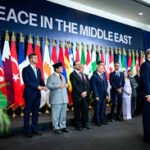The U.S. Plan on Gaza inclined in favor of Hamas ,Critics argue , the plan inadvertently legitimizes Hamas, which is designated as a terrorist organization by the U.S., the European Union, and several other countries. By engaging in direct or indirect negotiations with Hamas and potentially providing it with resources or political leverage, the plan could undermine efforts to promote more moderate Palestinian leadership and inadvertently empower the very entity responsible for much of the violence in the region.
![]()
The latest U.S. plan aims to address the humanitarian crisis in Gaza while attempting to establish a sustainable peace framework. The plan includes provisions for the reconstruction of Gaza’s infrastructure, the easing of the blockade imposed by Israel, and the facilitation of economic opportunities for Palestinians. While these objectives are ostensibly humanitarian, the plan’s execution and its political ramifications have drawn scrutiny.
The UN Security Council’s endorsement of the U.S. plan has added another layer of complexity. While the Council’s support lends international legitimacy to the plan, it also reflects the deep divisions among member states regarding the Israeli-Palestinian conflict. The Security Council’s approval was likely driven by a desire to alleviate the humanitarian suffering in Gaza and to support any initiative that might lead to a reduction in hostilities.
However, implementation is fraught with challenges. The Security Council’s decisions are often subject to the geopolitical interests of its permanent members, and in this case, differing views on how to handle Hamas and the broader conflict could impede cohesive action. Additionally, there is skepticism about the willingness of all parties involved to adhere to the plan’s provisions, especially given the deep-seated mistrust between Israel and Hamas.
Several key factors complicate the implementation of the U.S. plan:
- Hamas’ Role: As the de facto governing authority in Gaza, Hamas’ cooperation is crucial for any plan to succeed. However, its militant stance and history of conflict with Israel raise concerns about its commitment to peace and reconstruction efforts. The plan’s potential to strengthen Hamas’ political and military position could lead to further instability.
- Israeli Concerns: Israel’s security concerns are paramount in any discussion about Gaza. The Israeli government is likely wary of any arrangement that could embolden Hamas or lead to increased attacks on Israeli territory. Balancing humanitarian aid to Gaza with security assurances for Israel is a delicate task that the plan must navigate.
- Palestinian Authority’s Position: The Palestinian Authority (PA), led by Mahmoud Abbas, governs parts of the West Bank and is seen as a more moderate and legitimate representative of the Palestinian people. The PA’s exclusion or marginalization in favor of Hamas could weaken its position and undermine broader efforts towards a two-state solution.
- International Consensus: Achieving and maintaining international consensus on the plan is challenging. Different countries have varying stakes and perspectives on the conflict, and aligning these interests in support of the plan requires adept diplomacy and constant negotiation.
The U.S. Plan on Gaza inclined in favor of Hamas, a key actor in the ongoing conflict, despite its well-intentioned goals,. The UN Security Council’s endorsement adds a layer of legitimacy but also highlights the complexities of international diplomacy in resolving the Gaza issue. For the plan to be successful, it must carefully balance humanitarian needs, security concerns, and the political realities of the region. Ensuring that the plan does not inadvertently empower the main culprit of the war, Hamas, while still addressing the dire humanitarian situation in Gaza, will be a critical and challenging task.





Leave a Reply